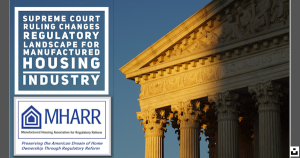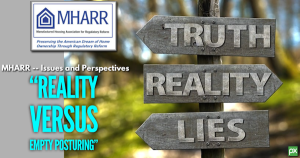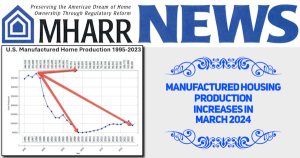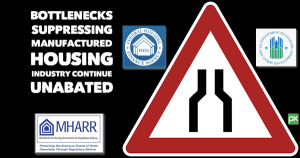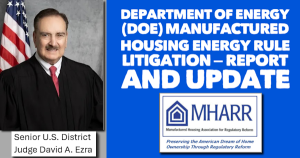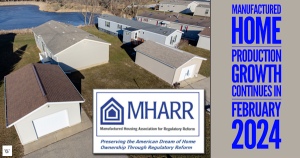Latest Developments Concerning DOE Manufactured Housing Energy Standards Rule
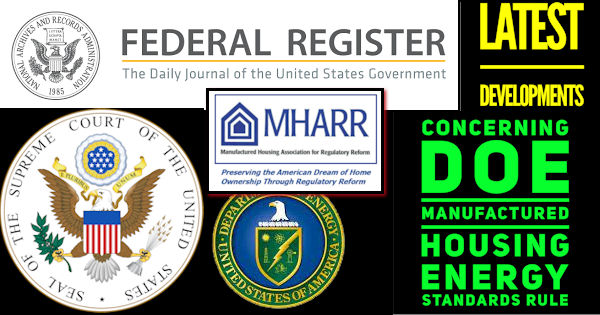
Washington, D.C., May 16, 2022 – In its continuing effort to either block or substantially modify a destructive, unnecessary and unnecessarily costly U.S. Department of Energy (DOE) manufactured housing energy standards rule, which is in its final stages, the Manufactured Housing Association for Regulatory Reform (MHARR), has filed an Amicus Curiae or “Friend of the Court” brief and related Motion for Leave (copy attached) with the United States Supreme Court.
MHARR’s filing is in support of a petition filed by ten states, seeking the reinstatement of a United States District Court injunction against the federal government’s use of the so-called “Social Cost of Carbon” (SCC) metric in connection with pending federal rulemaking activity. The nationwide injunction against reliance on the SCC metric in federal rulemaking was originally entered on February 11, 2022 by the United States District Court for the Western District of Louisiana, but was subsequently stayed by the U.S. Fifth Circuit Court of Appeals. The states’ Supreme Court Petition seeks a termination of that stay and a reinstatement of the injunction pending final determination of the federal government’s Fifth Circuit appeal.
MHARR’s brief addresses a key issue underlying the Fifth Circuit’s stay of the District Court preliminary injunction by showing, among other things, that the SCC metric has – and is — being relied-upon in the DOE manufactured housing energy standards rulemaking including, most particularly, DOE’s recently-published “final” Environmental Impact Statement (EIS) pursuant to the National Environmental Policy Act (NEPA) in support of its imminent manufactured housing energy standards rule. That rule, as MHARR has consistently maintained, and as is detailed in the brief, would add thousands of dollars to the retail cost of new manufactured homes and needlessly exclude millions of Americans from homeownership altogether.
Indeed, MHARR continues to assert that section 413 of the Energy Independence and Security Act of 2007 (EISA) — the basis for the DOE standard — has essentially been hijacked by “climate change” extremists and energy special interests to target the only segment of the housing industry that is federally-regulated and then extend such regulatory “overkill” to the rest of the housing industry. MHARR’s latest filing, therefore, is just the most recent in a longstanding effort to either stop or substantially modify DOE energy standards proposals that would crush the HUD Code market and undermine any hope of achieving the American Dream for millions of lower and moderate-income families. This stands in contrast with some in the industry, who have sought to compromise-with or otherwise accommodate DOE and/or its extremist supporters with dead-end technical proposals and inconsequential legislative activity.
MHARR’s brief accordingly, asks the Supreme Court to vacate the stay entered by the Fifth Circuit Court of Appeals and thereby reinstate the injunction entered by the District Court pending the resolution of the Fifth Circuit appeal. By taking this action, MHARR is fulfilling its pledge to oppose the discriminatory and destructive pending DOE manufactured housing energy rule by all reasonable means.
The DOE rule, based on DOE’s own cost estimates, which do not include regulatory compliance and enforcement costs and are, therefore, necessarily incomplete, would needlessly harm millions of lower and moderate-income Americans. Allowing that rule to go into effect without aggressive opposition would cause irreparable harm to the industry’s consumers. It would also reward DOE for its deceitful and duplicitous conduct throughout the rulemaking process, including but not limited to its sham “negotiated rulemaking” and, more recently, its “bait and switch” in jettisoning — after the conclusion of all public comment — its “tiered” standards approach to allegedly limit disastrous cost impacts on the industry’s lowest-income purchasers.
MHARR, therefore, will continue to adamantly oppose the impending DOE rule. In that regard, it is important to note that regardless of the outcome of the current Supreme Court appeal, the industry would still have the opportunity and, indeed, the obligation, to seek legal relief specifically targeting the DOE manufactured housing energy rule at an appropriate time of its choosing.
The Manufactured Housing Association for Regulatory Reform is a Washington, D.C.-based national trade association representing the views and interests of independent producers of federally-regulated manufactured housing.

Washington, D.C., May 16, 2022 – In its continuing effort to either block or substantially modify a destructive, unnecessary and unnecessarily costly U.S. Department of Energy (DOE) manufactured housing energy standards rule, which is in its final stages, the Manufactured Housing Association for Regulatory Reform (MHARR), has filed an Amicus Curiae or “Friend of the Court” brief and related Motion for Leave (copy attached) with the United States Supreme Court.
MHARR’s filing is in support of a petition filed by ten states, seeking the reinstatement of a United States District Court injunction against the federal government’s use of the so-called “Social Cost of Carbon” (SCC) metric in connection with pending federal rulemaking activity. The nationwide injunction against reliance on the SCC metric in federal rulemaking was originally entered on February 11, 2022 by the United States District Court for the Western District of Louisiana, but was subsequently stayed by the U.S. Fifth Circuit Court of Appeals. The states’ Supreme Court Petition seeks a termination of that stay and a reinstatement of the injunction pending final determination of the federal government’s Fifth Circuit appeal.
MHARR’s brief addresses a key issue underlying the Fifth Circuit’s stay of the District Court preliminary injunction by showing, among other things, that the SCC metric has – and is — being relied-upon in the DOE manufactured housing energy standards rulemaking including, most particularly, DOE’s recently-published “final” Environmental Impact Statement (EIS) pursuant to the National Environmental Policy Act (NEPA) in support of its imminent manufactured housing energy standards rule. That rule, as MHARR has consistently maintained, and as is detailed in the brief, would add thousands of dollars to the retail cost of new manufactured homes and needlessly exclude millions of Americans from homeownership altogether.
Indeed, MHARR continues to assert that section 413 of the Energy Independence and Security Act of 2007 (EISA) — the basis for the DOE standard — has essentially been hijacked by “climate change” extremists and energy special interests to target the only segment of the housing industry that is federally-regulated and then extend such regulatory “overkill” to the rest of the housing industry. MHARR’s latest filing, therefore, is just the most recent in a longstanding effort to either stop or substantially modify DOE energy standards proposals that would crush the HUD Code market and undermine any hope of achieving the American Dream for millions of lower and moderate-income families. This stands in contrast with some in the industry, who have sought to compromise-with or otherwise accommodate DOE and/or its extremist supporters with dead-end technical proposals and inconsequential legislative activity.
MHARR’s brief accordingly, asks the Supreme Court to vacate the stay entered by the Fifth Circuit Court of Appeals and thereby reinstate the injunction entered by the District Court pending the resolution of the Fifth Circuit appeal. By taking this action, MHARR is fulfilling its pledge to oppose the discriminatory and destructive pending DOE manufactured housing energy rule by all reasonable means.
The DOE rule, based on DOE’s own cost estimates, which do not include regulatory compliance and enforcement costs and are, therefore, necessarily incomplete, would needlessly harm millions of lower and moderate-income Americans. Allowing that rule to go into effect without aggressive opposition would cause irreparable harm to the industry’s consumers. It would also reward DOE for its deceitful and duplicitous conduct throughout the rulemaking process, including but not limited to its sham “negotiated rulemaking” and, more recently, its “bait and switch” in jettisoning — after the conclusion of all public comment — its “tiered” standards approach to allegedly limit disastrous cost impacts on the industry’s lowest-income purchasers.
MHARR, therefore, will continue to adamantly oppose the impending DOE rule. In that regard, it is important to note that regardless of the outcome of the current Supreme Court appeal, the industry would still have the opportunity and, indeed, the obligation, to seek legal relief specifically targeting the DOE manufactured housing energy rule at an appropriate time of its choosing.
The Manufactured Housing Association for Regulatory Reform is a Washington, D.C.-based national trade association representing the views and interests of independent producers of federally-regulated manufactured housing.




